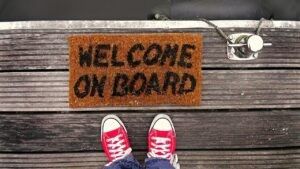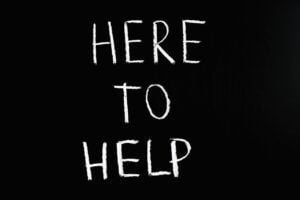We seem more disconnected than ever
We could blame COVID for the increased sense of being disconnected that I hear our members talk about, but I propose that there is another cause that predates COVID: our changing conservation community culture.
Our culture has changed. I feel qualified to talk about this because — like many people in our community — I was here almost 30 years ago. My perception is that back then, our culture was different. Of course, in the years between then and now, I’ve also changed, so it’s hard for me to be rock solid on whether our culture has changed, or whether I’ve changed, or some combination of the two!
Our culture then
 Back then, new conservation district board members would often get a phone call or an in-person visit to welcome them to their new role as a supervisor. Most of the time that first phone call came from their Conservation Commission field representative (we now call that position a regional manager). Field reps back then were much like circuit riders, traveling to the conservation districts in their region so that they could stay informed about issues and maintain vital working relationships. (Remember, too, that widespread use of email was simply not an available tool for conservation districts 30 years ago, so the three fundamental means of communicating were the telephone, postal mail/newsletters, and in-person visits.)
Back then, new conservation district board members would often get a phone call or an in-person visit to welcome them to their new role as a supervisor. Most of the time that first phone call came from their Conservation Commission field representative (we now call that position a regional manager). Field reps back then were much like circuit riders, traveling to the conservation districts in their region so that they could stay informed about issues and maintain vital working relationships. (Remember, too, that widespread use of email was simply not an available tool for conservation districts 30 years ago, so the three fundamental means of communicating were the telephone, postal mail/newsletters, and in-person visits.)
Often, the WACD area director (yes, there was only one per area at that time) would join the WSCC field rep in welcoming new district board members. Occasionally, the WSCC Executive Director or the WACD President would also reach out to offer their welcome and their availability if the new person had questions.
WSCC field reps did not always limit themselves to welcoming new conservation district supervisors. One of my fondest memories is being welcomed into the conservation district community by Bill Broughton. Bill was the field rep for the eastern region of Washington State (and yes, at that time, there were only three field reps: eastern, central, and western). He took the time to travel from Colfax to Republic to get to know me, to let me know he was there for me, and to help me adjust to the new context of being part of a larger community.
I will never forget how Bill proactively reached out and welcomed me. It is safe to say that I would not be here now if it wasn’t for the support I received from Bill, both during my Ferry Conservation District time and later when we were coworkers at the Conservation Commission. He wasn’t the only person who was supportive but he was the very first as I started my conservation district journey. Bill was ever after my go-to person when I had questions and needed advice.
There were certainly many others who helped me succeed. Some of you may remember Claudia Michaulke who was then managing the Stevens County Conservation District. She took me under her wing for a few months while I learned the ropes. Vicki Carter (Spokane Conservation District) was always there for me and I’ve tried to return that favor. John Sweetman — my own district chair at the Ferry CD — was an incredible cheerleader, making himself available day and night to help me succeed. Later, board supervisor Dean Fischer filled that same role.
I was able to repay some of those investments when Craig Nelson began his journey as the Okanogan Conservation District’s new manager. Since some of his customers were only 10 minutes from my office in Republic — but they were more than an hour from his office — I contacted him and offered to do the initial intake for folks that were close to my location. Just by reaching out and demonstrating that I was interested in his success, another long-term friendship blossomed. Ever since then, we have been there for each other during good times and bad.
It was from these folks and many others that I learned a fundamental truth: when you help others succeed, you succeed.
- Why Helping Others Succeed Can Be Your Greatest Success
- The Fastest Way To Achieve Success Is To First Help Others Succeed
- Five Ways To Help Those Around You Succeed: And How Being Nice Fosters Success for Everyone
- Act Like a Leader: Help Others Succeed. Build Strategic Alliances. Know Yourself.
Our culture now
 Our conservation district lives today seem ever so much more hectic than they were 30 years ago. Conservation districts are doing more than ever. The level of professional quality and accomplishment has just gotten better and better. Really large projects were very rare back then but they are almost commonplace today. Substantial conservation district budgets were barely imagined when I started in our community.
Our conservation district lives today seem ever so much more hectic than they were 30 years ago. Conservation districts are doing more than ever. The level of professional quality and accomplishment has just gotten better and better. Really large projects were very rare back then but they are almost commonplace today. Substantial conservation district budgets were barely imagined when I started in our community.
This has created a much stronger dependence of conservation district supervisors on selecting and supporting excellent district managers and other staff. Over the years, I’ve watched the style of many conservation district boards change from a top-down style of employing people (in which the generals order the privates to do the work) to a more collaborative approach (in which board and staff work jointly on how to achieve the district’s priorities). Although the roles and responsibilities for governing board members and district managers are distinctly different, there is a much stronger sense of partnership between boards and managers now than I recall from my early days.
And we have more field reps, aka regional managers! We’ve gone from three to five RMs! These professionals shoulder a huge range of tasks and responsibilities to help conservation districts succeed. One of the work connections of which I am most proud is my time as a regional manager for the Conservation Commission. For me, that time of service to our community was deeply satisfying.
However, despite having smart professionals at all levels, the pace of life has increased to the point that somewhere along the way, I think we stopped investing as much effort in welcoming new people to our extended conservation district family. The regional managers still do it — and they do it well! — but perhaps because of their proficiency and availability, the rest of us have let them pick up more and more of that important work.
Because conservation district governance and work require more proficiency than ever before, there are more “shalls and shall nots” communicated to new people. This is a vital piece of helping people know what they should and shouldn’t do as they hit the ground in their new roles. Nevertheless, I see less connection between community members than I remember from my early days.
I think that’s a shame. It pains me to recognize that sometimes, our newest folks flounder around as they try to figure out where they fit and how to move their interests forward. We don’t share enough context and history that would help them understand how their thinking meshes with our culture. Embracing their place in our larger community seems to happen more rarely, at least from my observations.
What simple things can we do?
 We will see some new folks coming on board this year because every conservation district had to hold an election in 2021! There are also a number of district manager positions that are transitioning. It’s time to return to the old days when we rolled out a welcome wagon for new people.
We will see some new folks coming on board this year because every conservation district had to hold an election in 2021! There are also a number of district manager positions that are transitioning. It’s time to return to the old days when we rolled out a welcome wagon for new people.
The simplest thing that we can do is something you can easily do: pick up the phone and welcome the new person to the community. They deserve to know that they are welcome, that we want them to be successful, and that there is a support system to help them be effective. The Center for Technical Development, Washington Association of District Employees, Washington State Conservation Commission, Natural Resources Conservation Service, Washington Association of Conservation Districts, and others are available to help people in our conservation community succeed.
If you experience some good chemistry with the new person, please invest more time with them. Find a way to learn more about them, and let them get to know you. Before COVID, it was a conversation over a cup of coffee that often helped to create those deeper, lasting bonds between people. It’s more difficult now because our time is in more demand and our ability to interact in person is more restricted, but it’s worth it to always reach out to folks to find out how you can help them succeed.
Why? Because people are important. Without great people in all roles in conservation districts, our conservation delivery system cannot be effective. It takes everyone working together — and working together well! — to make magic happen where it counts: on the land, in your community, with and for your neighbors. Without that, we have no purpose. Without great people to make it happen, we have no success.
You can also turn this around
When I returned to Washington State after nine great years in Oregon, I was warmly welcomed home. We should remember that providing a warm welcome to our partners also pays dividends. It may be a new Conservation Commission board member or employee, or a new Natural Resources Conservation Service person. Maybe it’s someone new with Extension or the Farm Service Agency or any of the many partners we enjoy. Take a moment to reach out and welcome them to our statewide conservation district family. If you make this a habit, I promise that you’ll end up enriched with many more great relationships.
May, June, July
During May, June, and July, I will be focusing on welcoming our newest people. I hope that you’ll join me in helping our new leaders and professionals feel welcome so that they can help us continue to grow conservation district success.
Tom Salzer, WACD Executive Director
